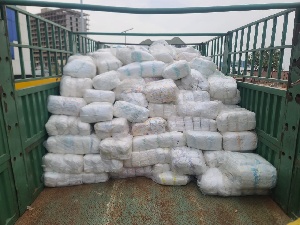- Home - News
- Elections 2024
- News Archive
- Crime & Punishment
- Politics
- Regional
- Editorial
- Health
- Ghanaians Abroad
- Tabloid
- Africa
- Religion
- Photo Archives
- Press Release
General News of Friday, 25 April 2025
Source: www.ghanawebbers.com
FDA intensifies crackdown on fake diapers amid growing health concerns
Ghana’s Food and Drugs Authority (FDA) has destroyed over one million counterfeit diapers. These diapers had entered the local market and were deemed hazardous to health. They were seized from two shipping containers and permanently removed from circulation.
The incineration took place in Ashaiman under strict supervision. This action is part of Ghana’s fight against counterfeit hygiene products. The FDA aims to eliminate low-grade baby care goods that do not meet safety standards.
A major concern is the source of these counterfeit products. In March, China’s state-run broadcaster CCTV revealed a troubling supply chain. Used diapers and sanitary pads are salvaged, reprocessed by rogue manufacturers, and sold as new items.
These goods fail to meet domestic regulations and are redirected to developing markets like Ghana at low prices. “These acts are not only unethical—they are dangerous,” said an FDA spokesperson.
They expose infants to serious health risks such as infections and allergic reactions. The FDA insists that Ghana will not be a dumping ground for hazardous goods.
In response, the FDA has increased collaboration with the Ghana Revenue Authority (Customs Division) and other agencies. New measures include enhanced border checks, random retail inspections, advanced lab testing, and stricter scrutiny of imports in the hygiene sector.
The Authority has also launched an awareness campaign for consumers buying baby care products. Signs of fake diapers include unusually low prices, unfamiliar branding, poor packaging quality, and lack of approval markings.
The public is encouraged to report suspicious products through the FDA’s helplines or online channels. The recent destruction exercise reaffirms the FDA’s mission: to uphold product quality and protect vulnerable populations.
It reflects a broader government stance led by the Ministry of Health against counterfeit baby products. “As regulators, we are committed to ensuring every child in Ghana has safe products,” emphasized the FDA.
“This is not just a regulatory obligation—it is a national duty.”











